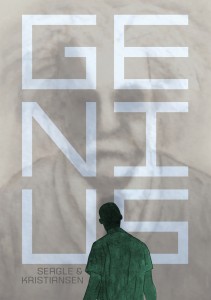 Genius
Genius
Written by Steven T. Seagle, Illustrated by Teddy Kristiansen
First Second, July 2013
128 pages / $17.99 Buy from First Second or Amazon
“Physics isn’t the most important thing. Love is.”
― Richard Feynman
Ted isn’t a genius. If he ever was a genius, it was when he was a child, skipping two grades, and postulating what the universe is expanding into (“red”). Now, he rides a desk in a cube farm, and his boss (the legendary “Needham”) is tiring of waiting for Ted’s to produce. Ted is an everyman physicist of an unspecified type. Whatever his area of work, it is definitely theoretical; he hasn’t published in years, though not for lack of trying.
It’s not an explicit threat, but Ted is still desperate—not just to save his job and livelihood, but to come up with that “one big idea” that will revolutionize the field, recapture his youthful genius, and allay his self-doubt all in one.
It’s no wonder that he’s having trouble producing anything.
This is not a young man’s game, Genius reminds us, in following with conventional wisdom from A Mathematician’s Apology on down through A Beautiful Mind. It’s certainly not a family man’s game, and most of the times we see Ted sitting down to think, he is interrupted to attend to family matters. At home his teenage son Aron is discovering the joys and horrors of puberty. His wife Hope is waiting for her test results from the doctor. His father-in-law (Frances) is his main foil, delivering barbs that are just as devastating whether he remembers who his son-in-law is or not. But Ted’s last longshot chance is a secret that Frances knows: a secret that Einstein himself told Frances when he was his bodyguard.

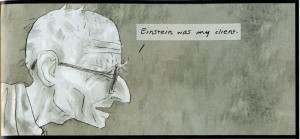
In Ted’s self-doubt he thinks often of Albert Einstein. The man is his god; he proclaims it straight out. Einstein appears in Ted’s dreams and daydreams—not as the man himself or even a character, but as an avatar of what Ted longs to attain but cannot.
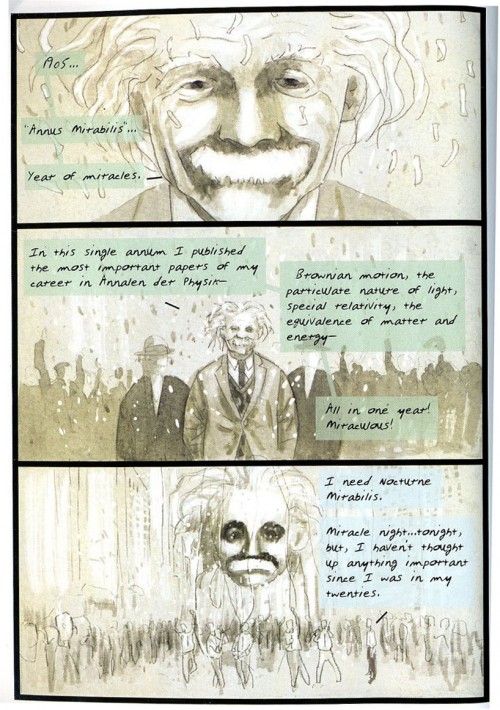 Genius makes an idol of Albert Einstein, but this story’s true spiritual deity is Richard Feynman. Einstein is about the whimsy of physics; Oppenheimer is about the tragedy. Feynman on the other hand, is all about the love.
Genius makes an idol of Albert Einstein, but this story’s true spiritual deity is Richard Feynman. Einstein is about the whimsy of physics; Oppenheimer is about the tragedy. Feynman on the other hand, is all about the love.
The difficulty in writing a good scientific genius story is in interpreting high level, high concept theory into an emotional narrative without betraying the source material. There are brilliant works of fiction about, for example, theoretical mathematicians. Arcadia is one, and Proof. Gödel, Escher, Bach is another recent example, a popular nonfiction text that doesn’t pull its punches when it comes to high level science.
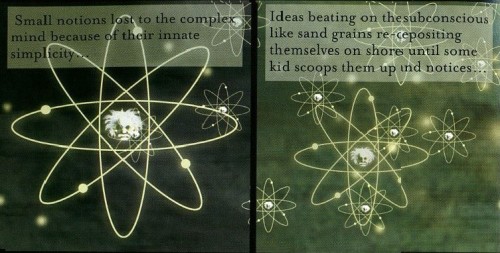 For all of Genius’s professed love, there is surprisingly little “capital s” Science. The “science” presented here is more a set of symbols and idols. Like the Bohr model atoms pervade the art—a simplified representation of a much more interesting, complex system. Perhaps this is the reason Seagle and Kristiansen focus exclusively on Einstein: the man so synonymous with genius that his name has become a cliché. Everyone can appreciate the meaning of an “Einstein,” even if they have no concept of Newtonian physics, let alone special relativity.
For all of Genius’s professed love, there is surprisingly little “capital s” Science. The “science” presented here is more a set of symbols and idols. Like the Bohr model atoms pervade the art—a simplified representation of a much more interesting, complex system. Perhaps this is the reason Seagle and Kristiansen focus exclusively on Einstein: the man so synonymous with genius that his name has become a cliché. Everyone can appreciate the meaning of an “Einstein,” even if they have no concept of Newtonian physics, let alone special relativity.
There is a familiar, legitimate emotion to this mindset. Imagine a precocious child in his classroom, bored of the lesson, daydreaming of his idols—Einstein, Edison, Nobel. The scientists in his textbooks are sidebar deities, a portrait and a list of their great achievements. A child has no references for the real-world research process. He doesn’t know anything of the long, hard slog of scientific experimentation or the complex intellectual work of theory. He imagines a secret, held in the minds of the scientists who thought it up.
When Ted has his big realization (as he must) it is represented by grunge watercolor spreads. The spreads do a decent job of graphically representing the feeling of having hit upon a brilliant idea, only to have it slowly fade away as you try to capture it. Often the art has bits of text and scrawled equations to allude to underlying scientific principles.
Throughout the graphic novel, the pencil work is soft and unpretentious, but the digital grunge patterns overlaid on top gives the art a muddy, incohesive feeling. The art does well by the characters, and Kristiansen does an admirable job of facial expressions and body language to show us a wide, believable range of emotions.
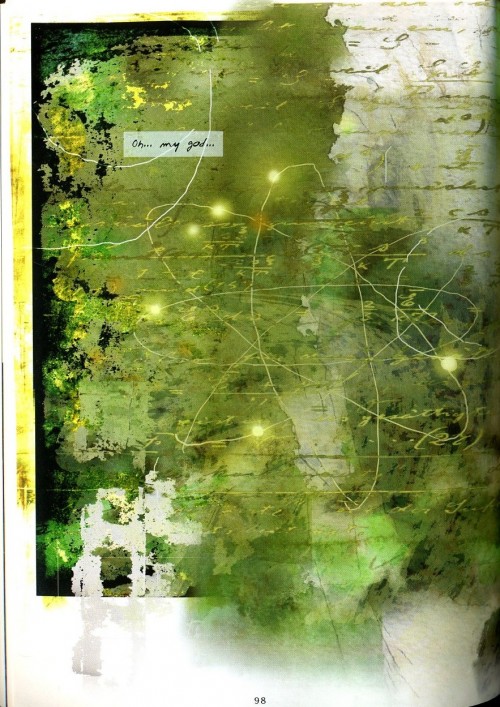 Genius aims to say something profound about the nature of science, genius and love. Andthere is no doubt that Seagle and Kristiansen have a genuine, profound feeling for it. But without the underpinning research the message of Genius lands solidly in platitude territory. Coming from Feynman, such a conclusion can be meaningful. The meaning of Feynman is as much about the love of complexity and the miracle of discovery and teaching as it is about caring for other people.
Genius aims to say something profound about the nature of science, genius and love. Andthere is no doubt that Seagle and Kristiansen have a genuine, profound feeling for it. But without the underpinning research the message of Genius lands solidly in platitude territory. Coming from Feynman, such a conclusion can be meaningful. The meaning of Feynman is as much about the love of complexity and the miracle of discovery and teaching as it is about caring for other people.
Without the science, Genius builds up what a fiction author knows best: compelling plot and characterization. We find Ted’s struggles meaningful and generally root for him; his relationships with each of his family members are unique and touching.
Genius hints at genuine critiques of the difficulty of balancing work and home life, of the absurdity of publish or perish, and of the struggle to achieve an E=MC2 moment. And yet, it is reductive to imply a Beatles solution is called for here. Love is not all you need.
***

Tags: Claire Blechman, genius, Steven T. Seagle, Teddy Kristiansen
